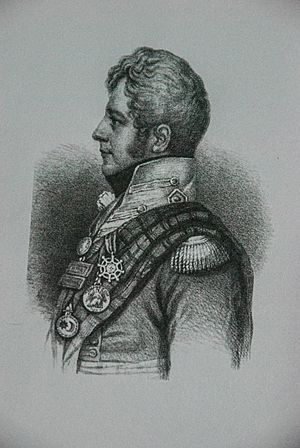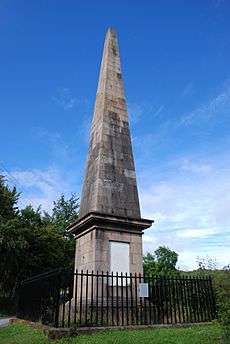John Cameron of Fassiefern facts for kids
Quick facts for kids
John Cameron of Fassiefern
|
|
|---|---|

Colonel Cameron
|
|
| Born | 16 August 1771 Inverscadale, Inverness-shire, Scotland |
| Died | 16 June 1815 Quatre-Bras, Netherlands (now Genappe, Belgium) |
| Buried | |
| Allegiance | |
| Service/ |
|
| Rank | Colonel |
| Unit | 92nd Highlanders |
| Battles/wars | French Revolutionary Wars Peninsular War Waterloo campaign |
Colonel John Cameron of Fassiefern (1771–1815) was a famous Scottish military leader. He lived during the Napoleonic Wars, a time of big conflicts in Europe. John Cameron was a cousin of the important Camerons of Lochiel family.
He served as a Colonel in the Gordon Highlanders, a well-known Scottish regiment. Sadly, he was killed in battle at Quatre-Bras. To honor his great service, The Prince Regent made John's father a baronet in 1817.
Contents
Early Life of John Cameron
John Cameron was born in Inverscadale, near Loch Linnhe, on August 16, 1771. He was one of six children. His father was Sir Ewen Cameron, 1st Baronet, from Fassiefern. John grew up with strong connections to his family and their traditions.
He went to school at Fort William Grammar School. He also had private teachers. Later, he studied at King's College, Aberdeen. After that, he started training to become a lawyer in Edinburgh.
Joining the Army: French Revolutionary Wars
When the French Revolutionary Wars began, John Cameron wanted to join the army. In May 1793, he became an Ensign in the 26th Cameronians. Soon after, he was promoted to lieutenant. He joined a new Highland Company.
In 1794, George, Marquess of Huntly started a new group of Highlanders in Aberdeen. This group became the 92nd Gordon Highlanders. John Cameron was put in charge of a company in this regiment.
Battles and Injuries
From 1795 to 1797, Cameron served in Corsica and Gibraltar. In 1798, he was in the south of Ireland. The next year, 1799, he fought in North Holland. He was wounded in a tough battle on October 2. This was near Bergen and Egmont-op-Zee. It was one of the last times bayonets were used in a big fight.
In 1800, he fought at the Île-d'Houat and Cadiz. He then went to Egypt. There, he was wounded again at the Battle of Alexandria. For his service in Egypt, he received a special Gold Medal.
Fighting in the Peninsular War
In 1801, John Cameron was promoted to major in the Cameron Highlanders. By 1808, he became a lieutenant-colonel. He was put in charge of a new second battalion. This battalion mainly served in Ireland.
Later, Cameron took command of the 1st Battalion Cameron Highlanders. He led them in the Walcheren Campaign. Then, in October 1810, he and his troops went to Portugal. They fought very well in many battles during the Peninsular War.
Key Battles and Achievements
His regiment showed great bravery in several important battles:
- The Battle of Fuentes de Oñoro on May 5, 1811.
- The Battle of Arroyo dos Molinos on October 28, 1811.
- The Battle of Almaraz on May 19, 1812.
- The Battle of Vittoria on June 21, 1813.
- The Passage of Maya on July 13, 1813.
- Battles on the Nive between December 9 and 13, 1813.
- The Passage of the Gave at Arriverette on February 17, 1814.
- The Capture of Acre on March 2, 1814.
Waterloo Campaign and Death
During the Waterloo Campaign in 1815, Colonel Cameron's 92nd Foot regiment was part of the 9th Brigade. They marched out of Brussels on June 16, 1815. On that day, they attacked an enemy position near the village of Quatre-Bras.
While leading his regiment, Colonel Cameron was badly wounded. He died the next morning, on June 17, 1815. He was buried by the side of the road. His foster brother, Private Ewen McMillan, and a close friend, James Gordon, buried him. A few other soldiers who were wounded also helped.
A soldier named Harold Chisholm, who was with the 92nd Foot, helped carry Colonel Cameron off the battlefield. Chisholm later met the Duke of Wellington. He led the Duke to the house where Colonel Cameron was dying. The Duke was very sad to see him.
Burial and Memorial
Later, Colonel Cameron's family asked for his body to be brought home. It was brought back to Scotland by ship. About three thousand Highlanders from Lochaber came to his burial. He was laid to rest in Kilmallie churchyard. An obelisk with a quote by Sir Walter Scott marks his grave.
Family Honor: The Baronetcy
In 1817, a special honor called a baronetcy was created for John Cameron's father, Ewen Cameron of Fassiefern. This was done to recognize John's amazing service in the military after his death.
Sir Ewen Cameron passed away in 1828. John's younger brother, Duncan, then became the 2nd Baronet. However, the Cameron baronetcy of Fassiefern ended in 1863 when there were no more direct heirs.
See also
- Cameron baronets
- Clan Cameron
- Highlanders (Seaforth, Gordons and Camerons)
 | William L. Dawson |
 | W. E. B. Du Bois |
 | Harry Belafonte |


